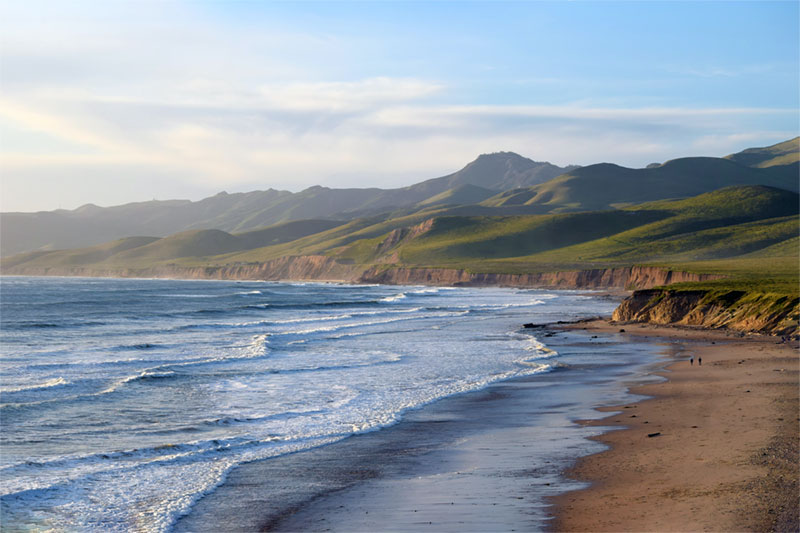1995
A day trip to Jalama Beach, by way of the flower fields.
Today is the last day I will smell the purples and creamy whites, all the shades of red passing by the backseat window. There’s nothing in the sky to signal that this is my last time relishing the scent of a rainbow. Nothing telling me to inhale so deeply that my nose grabs hold of the fragrance, storing it inside me so I can recall it on days brimming with remembrance and melancholy.
My stepsister sits across from me in the backseat, behind my stepfather. She’s visiting from out of town, which means we get to go to the beach. These trips are delectable treats that dampen a gnawing hunger for adventure that grows steadily inside me during the week. Our parents whisper to each other up front. It’s a habit they will maintain throughout long drives in subsequent years. Leaning and whispering. My stepfather’s brown eyes check over his wide shoulder to make sure we aren’t listening—right before he raises the music’s volume to ensure we can’t hear them.
I lean toward the window and open my mouth; my breath fogs up the glass. Each exhalation presses a cloud onto the pane before it dissolves into nothing. I hah haaah until another cloud forms then I draw a smiley face into the glass. It’s not enough to embrace the well-worn comfort wrapped around me. It’s not enough that my brown cheeks ache, joy digging into the corners of my mouth. It’s not enough to sit here in this moment, letting the day unfold petal by petal, beat by beat.
I want every molecule in my ten-year-old body to blend with my surroundings. I want to be the dirt and slate sky, the perfumed scents swirling on the seawater breeze and the lyrical flow spitting from the radio. The previous year, my parents and I lived in Pennsylvania while my stepsister stayed behind with her mother. I made my first snowman and ate my first venison burger, and I was called n—r for the first time. As the only Black kid in school, racism’s blunt hand left me ostracized in the classroom and on the playground. I was often deflated by the time my parents picked me up in the afternoon. I existed in a transient space, outside the borderlines of acceptability, until I buckled myself in the Volvo and I heard the sharp click of a cassette in the tape deck. Then my father rapped alongside Craig Mack and thumped his fingers against the steering wheel as we wound our way down the frozen mountainside. I just listened, watching how the words and beat transformed my father. Saw how they settled his six-foot frame into the driver’s seat. Watched him be at ease. I eventually tapped my fingers against the burgundy leather seats and let the words rock inside me and burrow into my bones. I siphoned Craig Mack’s flow directly into my blood. It was a complete restoration of what I’d lost during the day. Just as I was learning the lyrics, we moved back to the West Coast and Craig Mack became the freedom anthem that sounded when the smell of larkspurs and saltwater permeated the air.
I mutter the lyrics and bob my head. Tiny clouds rhythmically burst onto the window. I am vibrating at a frequency that threatens to explode in the space around me. Maybe my father senses this too, or maybe he’s trying to be what he calls funny. So, when my mother asks him to roll down the window, he rolls down mine too. Air smacks my face, rushing up my nostrils and filling my open mouth. I turn my head to dislodge the wind’s sharp fist jammed into the back of my throat. My father laughs.
We drive, all the windows down, the wind ruffling our clothes and hair, for a little while. The air is chilly and damp from the Pacific Ocean in the distance. My father raises the volume on the radio. We drift past the rainbow in petaled rows, ready to be plucked. The funk beats are incongruous with the tranquil scenery, but we exist loudly in the space reserved for serenity. The wind snatches at the lyrics floating in the space between us. They fade in and out as the wind scatters them over the larkspurs. We lean farther out our respective windows and point at the rows of fuchsia and mustard and jade and white and every other color we could ever imagine.
Today is the last day I give myself to the blooms and tides, but I don’t know that yet. Instead, we cruise along in silence until the Volvo lurches as we pick up speed and head toward the beach. My father turns the music back on. I nod along and watch as my parents lean in toward each other again and talk underneath the music. Sometimes, when I look back on this memory, I imagine my parents are discussing the brother they have yet to tell my sister and me about. Forming his presence out of the surrounding Queen Anne’s lace and fog until there’s nothing left for me to enjoy in the days after. It felt like conspiracy then. Now, it just feels like abundance.
DW McKinney
DW McKinney is a writer and editor based in Nevada. Her work has appeared or is forthcoming in Los Angeles Review of Books, Ecotone, The Normal School, Barrelhouse, and Hippocampus Magazine, among others. She is a nonfiction editor for Shenandoah and editor-at-large for Raising Mothers. Say hello at dwmckinney.com.

